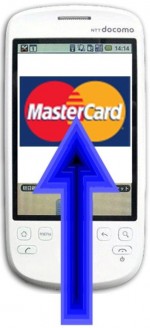The credit card giant recently announced the beginning of a massive database for mapping available applications.
MasterCard unveiled its intentions at the World Retail Congress to begin a Europe-wide mobile app index that will map all of the shopping applications that are publicly available in Europe.
The name of this effort will be the Mobile Top App Index by MasterCard.
The purpose of this mobile app index will be to help to identify some of the best shopping applications that are available throughout the diverse European marketplaces. It is also meant to help to pinpoint some of the ways in which consumers in that part of the world are adopting and using their smartphone and tablet technologies as the shop while they are on the go. The top mobile commerce apps in Europe will be broken down into twenty different categories and are going to be announced next March at the Mobile World Congress.
The company hopes that its mobile app index will help to highlight some of the winning solutions out there.
 According to the MasterCard Europe president, Javier Perez, it has never been easier to purchase products and services through the use of mobile devices, “as innovation goes hand in hand with growing consumer demand.” He went on to explain that “MasterCard is a technology company connecting banks, retailers and consumers. Our Mobile Top App Index will highlight the most outstanding solutions in the mobile shopping app arena for the benefit of European consumers and retailers.”
According to the MasterCard Europe president, Javier Perez, it has never been easier to purchase products and services through the use of mobile devices, “as innovation goes hand in hand with growing consumer demand.” He went on to explain that “MasterCard is a technology company connecting banks, retailers and consumers. Our Mobile Top App Index will highlight the most outstanding solutions in the mobile shopping app arena for the benefit of European consumers and retailers.”
The ratings in the index will be applied to mobile commerce apps across thirty six different countries in Europe. This will be the result of the efforts of a dedicated team of experts from the company, in conjunction with Associate Professor (Reader) in Digital Innovation, Dr. Carsten Sørensen, from the London School of Economics and Political Science. Dr. Sørensen stated that the great diversity in m-commerce applications “fundamentally changes the way people think about their tasks.”
Dr. Sørensen also added that since shopping is among the activities that device users do quite regularly, this new index could potentially assist consumers in being able to find exactly the mobile app they require and it will become a driver for the industry as a whole.
Denny |
September 26, 2014
New solution to the mobile commerce security problem could be here
As mobile commerce becomes more popular, questions regarding its security are beginning to be raised. Some consumers have expressed a lack of confidence in mobile payment systems, claiming that they do not do enough to protect their financial information. The Mobile Payments Industry Workgroup believes that a new way to keep consumers information sector is becoming more viable. The organization believes that tokenization could help instill more confidence in mobile commerce among consumers.
Tokenization may be able to make mobile commerce more secure and protect consumer information
Tokenization involves the digitization of financial information. Instead of using these information directly, mobile payment platforms use “tokens” as a way to authenticate a payment from a mobile device. The tokenization process involves the random generation of a substitute value that is meant to replace financial information. Because tokens do not contain actual financial information, they are often considered as a viable way to keep consumers safe when they are participating in mobile commerce.
Security has held back the growth of the mobile commerce field for some time now
 Security issues have been a barrier that the mobile commerce space has had trouble overcoming. Over the past few years, high-profile cyber attacks have called into question the overall security of mobile platforms and have reduced consumer confidence in the mobile payments field. Without adequate security, the growth of mobile commerce may be stymied. The use of tokens as a replacement for financial information may help solve this problem in the future.
Security issues have been a barrier that the mobile commerce space has had trouble overcoming. Over the past few years, high-profile cyber attacks have called into question the overall security of mobile platforms and have reduced consumer confidence in the mobile payments field. Without adequate security, the growth of mobile commerce may be stymied. The use of tokens as a replacement for financial information may help solve this problem in the future.
Tokenization lacks standards and coordination, making it difficult to implement in the mobile commerce field
While tokenization is gaining momentum, there are still many challenges facing its widespread adoption. The most significant of these challenges is the lack of standards and coordination within the mobile payments space. Organizations have yet to agree and work together on how tokenization can be implemented so that tokens can see widespread use. Currently, Visa and MasterCard are the two largest companies that are implementing a tokenization service in order to make mobile payments more secure than they have been in the past.
 According to the MasterCard Europe president, Javier Perez, it has never been easier to purchase products and services through the use of mobile devices, “as innovation goes hand in hand with growing consumer demand.” He went on to explain that “MasterCard is a technology company connecting banks, retailers and consumers. Our Mobile Top App Index will highlight the most outstanding solutions in the mobile shopping app arena for the benefit of European consumers and retailers.”
According to the MasterCard Europe president, Javier Perez, it has never been easier to purchase products and services through the use of mobile devices, “as innovation goes hand in hand with growing consumer demand.” He went on to explain that “MasterCard is a technology company connecting banks, retailers and consumers. Our Mobile Top App Index will highlight the most outstanding solutions in the mobile shopping app arena for the benefit of European consumers and retailers.”
 Security issues have been a barrier that the mobile commerce space has had trouble overcoming. Over the past few years, high-profile cyber attacks have called into question the overall security of mobile platforms and have reduced consumer confidence in the mobile payments field. Without adequate security, the growth of mobile commerce may be stymied. The use of tokens as a replacement for financial information may help solve this problem in the future.
Security issues have been a barrier that the mobile commerce space has had trouble overcoming. Over the past few years, high-profile cyber attacks have called into question the overall security of mobile platforms and have reduced consumer confidence in the mobile payments field. Without adequate security, the growth of mobile commerce may be stymied. The use of tokens as a replacement for financial information may help solve this problem in the future.